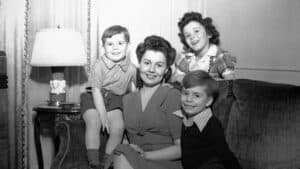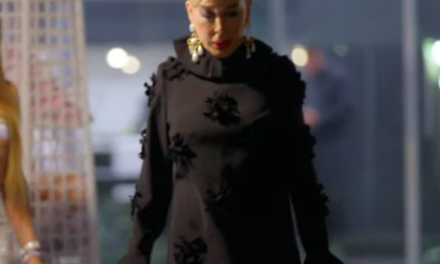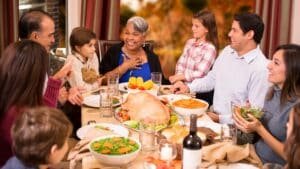
We are all worrying about prices and the cost of energy, aren’t we? We wonder how we will cope this winter. I feel for young families in 2022. But it has made me think what life was like.
Post-War Life
I grew up in the 1950s when, post-war, there was little of anything in the shops as all factories had been making weapons for six years, so it took time for them to adapt machinery to produce household items.
My pram in 1945 was a hand down. This one pram had been used by all the babies in our large family. Only the rich had cars, so the price of petrol wasn’t an issue. We walked everywhere and, once we could ride a bike, we cycled.
For food, bread and dripping was a common snack. It gave us energy. My mother cooked stew and dumplings, liver casseroles and sausages. My father grew all our vegetables in his garden. The only outing was to the swimming pool or to play tennis in the nearby park. Otherwise, we played in the garden.
Buying a Property
Soon after our marriage in 1965, with my husband sent on an unaccompanied posting, I moved back in with my parents and found a job. I was saving for the deposit on a house, so they took minimal housekeeping.
On his return, we bought a property – a modest two-bedroom bungalow. I worked for a year before I had my first baby, and two years later our second daughter was born. During the next three years, we witnessed houses being built on a field behind our bungalow. We sold up and bought a three-bedroom house.
Into the 1960s
When I think back to the 60s and managing housekeeping on an RAF Corporal’s wage – it wasn’t enough to call it a salary – I don’t know how I did it. I had five pounds a week to feed us and, later, to buy clothes for the children.
Luckily, I had worked full-time until I was six months pregnant, after which I was due maternity pay which lasted until my baby was two months old. The week after I left work, I recall a sense of foreboding, having lost my weekly pay of about £3.50.
My parents and my grandmother visited and brought boxes of food which were gratefully accepted. My parents-in-law also brought groceries on their visits. Interestingly, my mother-in-law worked in her local supermarket, and she and my father-in-law lived on food just out of date. Their gift box often included some of these.
While some of my contemporaries returned to some form of flexible working soon after their second child, it was practically impossible for me to do the same. My husband worked shifts that varied every week. By Thursday, I was often broke, and we ate beans on toast. Worse, I remember no money for the baby’s tights as autumn set in. But I had blankets.
Finding and Saving Money
When I look back, I have always worked my way out of financial hardship, even when I had toddlers. This 2022 cost of living crisis has reminded me how I scraped money together and worked at bringing a few pounds in every week, even saving some money.
For a start, I made all my children’s clothes, something that is easier with girls. They were the first children in our neighbourhood to have little shift dresses because my dressmaking skills were limited.
I bought material on markets and raided shops for remnants. I had empty matchboxes in a kitchen drawer into which I put one or two shillings each week. Labelled ‘holidays’, ‘Christmas’ and ‘birthdays’ they were a source of great amusement to my father-in-law who described me as ‘tight’.
Working Mothers
My next-door neighbour had grown up in Oxford, and, by the time her little boy was six months old, she was leaving at six o’clock every morning to drive to work, leaving her baby with her mother. In our village and among the RAF community in Brize Norton, a working mother was rare.
Within a year, they sold their bungalow and moved closer to her parents. My friends from the National Childbirth Trust classes carried on meeting in each other’s houses for cups of tea and sharing ideas on how to make ends meet, our babies sitting with toys on the fireside rug.
Earning Money
When my daughters were aged four and two years old respectively, I took on an Avon round. I walked around my allocated area with the girls taking turns to sit in the pushchair. They would help push the next catalogue through the doors of all my customers.
My round included the RAF married quarters near home. Most of the married quarters were occupied by families fresh from overseas postings and, having had no access to shops selling cosmetics, they had become accustomed to Avon products.
By January 1973, I was expecting my third child, but I continued my Avon round, sometimes taking the car to move around areas on the large RAF base. There was a lot of interest in my third pregnancy and my two little girls who accompanied me often. I kept the round going until I was eight months pregnant by which time I had the thirst for earning.
Scanning the local paper, I found a job requiring the use of a car, possible for me because my husband walked to work. The job was managing a weekly free paper round delivering papers to the boys and paying them.
The thirst for earning continues but now focuses on writing.
Let’s Have a Conversation:
What was your life like in the 1950s? Did you face financial hardships? How have you earned money when your children were young?





